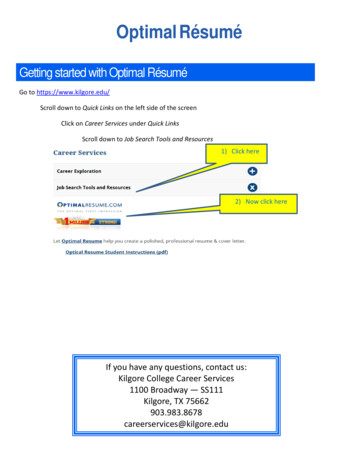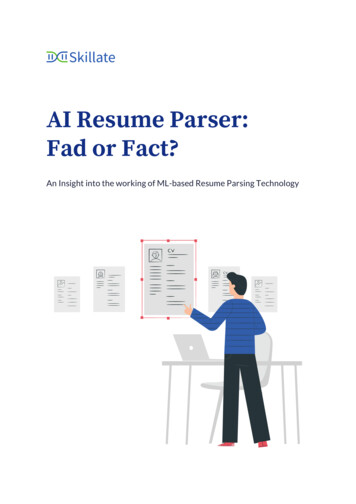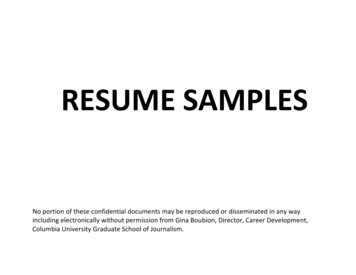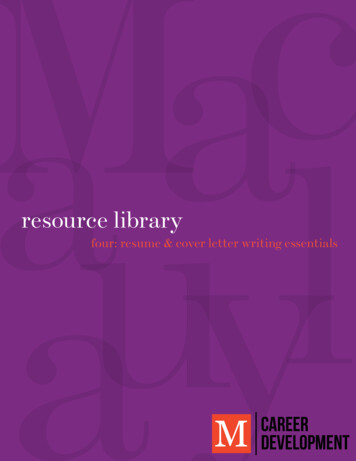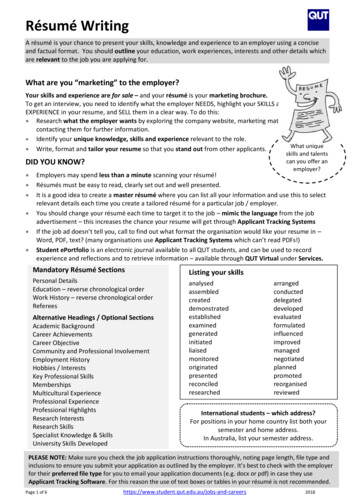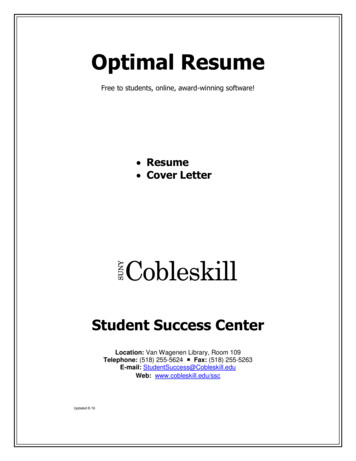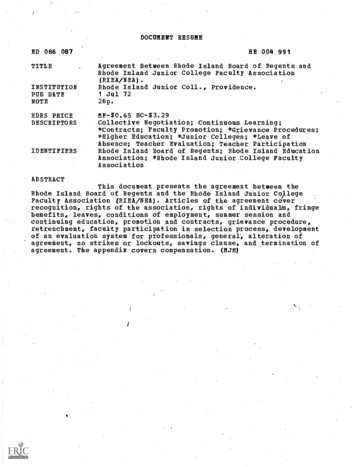
Transcription
DOCUMENT RESUMEED 086 087HE 004 991TITLEAgreement Between Rhode Island Board of Regents andRhode Island Junior College Faculty AssociationINSTITUTIONPUB DATENOTERhode Island Junior Coll., Providence.1 Jul 72EDRS PRICEDESCRIPTORSMF- 0.65 HC- 3.29Collective Negotiation; Continuous Learning;*Contracts; Faculty Promotion; *Grievance Procedures;*Higher Education; *Junior Colleges; *Leave ofAbsence; Teacher Evaluation; Teacher ParticipationRhode Island Board of Regents; Rhode Island EducationAssociation; *Rhode Island Junior College CTThis document presents the agreement between theRhode Island Board of Regents and the Rh6de Island Junior Co/llegeFaculty Association (RIEA/NEA). Articles of the agreement coverrecognition, rights of the association, rights of individualist fringebenefits, leaves, conditions of emplOyment, summer session andcontinuing education, promotion and contracts, grievance procedure,retrenchment, faculty participation in selection process, developmentof an evaluation system for professionals, 'general', alteration ofagreeient, no strikes or lockouts, savings clause, and termination ofagreement. The appendix covers compensation. (MJM)
FILMED FROM BEST AVAILABLE COPYAGREEME.N TBETWEENRHODE. ISLAND BOARD OF REGENTSANDRHODE ISLAND JUNIOR COLLEGEFACULTY ASSOCIATION(RIEA/NEA)4'
INDEXPagePreambleArticle1Recognition2Article IIRights of the Association2Article IIIRights of Individuals3Article IVFringe Benefits4Article VLeaves5Article VIConditions of Employment9Article VIISummer Session & Continuing Education11Article VIIIPromotion and Contracts11.Article IXGrievance Procedure15Article XRetrenchment17Article XIFaculty Participation in SelectionProcess18Article XIIDevelopment of an Evaluation Systemfor Professionals21Article XIIIGeneral21Article XIVAlteration of Agreement21Article XVNo Strikes or Lockouts22Article XVISavings Clause22Article XVIITermination of Agreement22Appendix ACompensation24I
-1-PREAMBLEThe Board of Regents, hereafter called theBoard, and theRhode Island Junior College Faculty Association(RIEA/NEA),hereinafter called the Association, enter into thisAgreementas of 1st day of July, 1972 with the expectation thatitsimplementation will enhance the ability of the Junior Collegeto serve its constituents.
ARTICLE IRECOGNITION.The Board of Regents recognizes the Rhode Island JuniorCollege Faculty Association (RIEA /NEA) as the exclusivebargaining agent for' all collective negotiations underconditions set forth in the General Laws of Rhode Island,Title 36-11, for all employees of Rhode Island JuniorCollege who are members of the bargaining unit outlinedin the Rhode Island-Labor Relations Board, Case EE NO.1984.ARTICLE IIRIGHTS OF THE ASSOCIATIONA.The Association shall have the right to conduct.officialbusiness on anycampus at any reasonable timeprovided that this business does not interrupt normalcollege operations.iB.The Association'shall have. the rightto use faculty mailboxes for communications,including mass distribution.An Association bulletin board will be made available tothe Association on all Junior Collee:campuses.CNothing contained herein shall be construed.to deny orrestrict any faculty member's.rightsie.may have underthe General Lawsof the State:of Rhode Island or otherapplicable laws-andregulations.D.The Regents recognize the Association's.right to.haveaccess to information relative.to:budget.requests.andauthorization', staffing-projections,':register of professional persOnnel, names and addresses.and salariesof all faculty in the-bargaining unit,.and agenda andminutes of all. Regents'-meetings. Where material is.normally available 'to the public, the Association willutilize the avenues of acquisition as the public:It is .understood that this shall not be construed torequire the'collegeto compile information and statistics in the form requested which are 'not already compiledin that form.Upon.written request the Associationshall furnish information requetted by the college.F.The college administration.shall advise the Associationon new or modified, long'range institutional planning.
-3-F.The President of the Associa'tion or his designee willbe represented as a voting member on the President'sAdvisory Council and the Curriculum Committee.ARTICLE IIIRIGHTS OF INDIVIDUALSA"Academic freedom" is essential to the college andits faculty and applies to both teaching and research.Freedom in research is fundamental to the advancementAcademic freedom in its teaching aspectsof truth.is fundamental for the protection of the rights of theteacher in teaching' and of the students to freedom inIt carries with it duties correlative withlearning.rights."The teacher is entitled to freedom in the classroomin discussing his subject."BPersonal Freedom - No faculty member shall, on thegrounds of sex, race, color, religion, national origin,political affiliation, or membership in the Association,be excluded from participation in, denied benefits, orbe subjected to discrimination of any kind.CMeetings - The Association redognizes the importance ofparticipating in the activities of the Junior College.However, attendance at all meetings will be strictlyvoluntary, with the exception of general faculty meetingsat the beginning of each semester or summer session.D.Personnel FilesThe college shall maintain an official personnelfile for each employee who is subject to this agreement.Such file shall contain copies of personnel transactions,official correspondence with the employee and the evaluation reports prepared by the college.1.The employee shall have the right to examine hisofficial personnel file at any time during normalbusiness hours and to file a statement in response toany item placed in his file, provided, however, anyletters of recommendation solicited in connection withhis employment shall not be available to that employeeor his representative.2.A designated. member of the Association, havingwritten authorization from the employee concerned, and3.
-4--in the presence of a representative of the administration,may examine the official personnel file of that employee,except for the limitation provided above, if the examination relates to a filed grievance, a grievance in preparation, or written charge or charges preferred against theemployee by the college.Copies of materials in an employee's official personnelfile shall be permitted for official college purposes,for use at formal proceedings or grievance reviews orfor the express use of the individual employee, but shallnot be permitted for any other purpose.4.A faculty member shall have the right to reproduceat his or her cost.all documents in his or her personnel5.file.ARTICLE IVFRINGE BENEFITSA.Health Insurance - All employees covered by this agreement are subject to and have the benefits of the StateHealth Insurance Program.B.Life Insurance - All employees covered by this agreementare subject to and have the benefits of the State GroupLife Insurance Program.C.Disability. Insurance - All employees covered by thisagreement are subject to and have the benefits of theState ERS or TIAA Group Insurance Policy whichever applies.D.Sick Leave - In the event of accident or sickness whichTenders any faculty member temporarily incapable ofperforming his duties, sick leave may be granted by thecollege as follows:A member of the faculty who has served as such for twoyears or less may be granted as much as one month's sickleave with full pay.For each subsequent year of servicebeyond two years, :le may be granted an additional halfmonth of.sick leave until the accumulated total reachesa maximum of twelve months.If, after the entire sick leave allowance for a facultymember has been used, he is still unable to resume his dutieshe shall apply for a leave, with or without pay, or resign,and the decision shall rest with the President and the,Board of Regents or its designee.
-5-E.Retirement Program - Full-time members of the faculty whoare exempt from the merit system of the State of RhodeIsland shall be required to participate in the TeachersInsurance and Annuity Association (TIAA) retirementprogram after two years of service and attainment ofage 30 as a condition of employment and as provided byEmployees who are members of the Rhode Islandlaw.Employee Retirement System at the time of employmentshall be excepted.Participation is permitted, on avoluntary basis, on completion of two years of employmentfor eligible employees under 30 years of age.ARTICLE VLEAVESA.Sabbatical Leave - A member of the faculty who has servedfull time for at least six years, who has the rank ofassistant professor or above and who is on continuingappointment shall be eligible for sabbatical leave.Sabbatical leave may beigranted for graduate study,post-doctoral study, research or other professionalimprovement for a period of one year at half pay, or forone-half year at full pay.Sabbatical leave shall be granted with the understandingthat the recipient shall, upon the termination of theleave, return to his duties at the college for at leatone year unless, by mutual: agreement between the facultymember and the President, it is deemed inadvisable forhim to do so. At the close of the period of leave, thefaculy member shall file with his dean a report of hisprofessional activities during his absence.Upon the completion of the contractual year during whichthe sabbatical leave is taken, the faculty member shallbegin again to accumulate leave service credit, becomingeligible For an additional sabbatical leave upon theaccumulation of an additional (minimum) six-year periodof service credit.If a faculty member shall serve more than six years beforehis first sabbatical leave, or between sabbatical leaves,the additional years beyond six shall not be credited towardthe service-credit requirement for the next or any subsequentsabbatical leave.However, a ,faculty member whose approved sabbatical leavehas been deferred or postponed because of replacement or
-6-other operational difficulties, shall begin to accumulate service credit for his next sabbatical leave asof the scheduled start of the deferred or postponedleave but not including the time, if any, eventuallyspent on the deferred or postponed leave.When on sabbatical leave, a faculty member shall bepermitted to receive travel, expenses, fellowships,grants-in-aid or other financial assistance fromsources other than the college provided he is notrequired to perform duties detrimental to the objectivefor which his leave has been granted. However, if heaccepts employment for pay during the leave period, hiscollege compensation will normally be reduced by theamount necessary to bring his total compensation forthat period to a level comparable with his normalprofessional income.Nothing in this section on sabbatical leave shall beconstrued to mean or imply that two consecutive periodsof sabbatical leave after 12 or more years of continuousservice are permitted.The interest of the college, in addition to the professional and personal needs of the individual, shall be amajor consideration in granting the leave.The amount of leave shall be calculated at the rate ofone month of leave for each year of service.Normally, leaves shall be granted only after six yearof service but, under special circumstances, leavesof shorter or longer duration may be granted, with aminimum of three months and a maximum of nine months.Requests for leave shall be processed through the officeof the Vice President for Academic Affairs, to the President.No more than five percent of the total faculty will beabsent on sabbatical leave at any one time.ProVision for the cost of sabbatical leave shall be madein division budgets. For this to be accomplished, anapplication for sabbatical leave, in the form of a detailedwritten statement of purpose for the leave, shall besubmitted by May 1, 16 months before the academic yearfor which the leave is requested.In exceptional circumstances, late application for sabbatical leave shall beconsidered.Conditions of Return to Duty after Leave - Upon his returnfrom sabbatical leave, an employee's salary shall be thesame as he would have received had.the period of his leave
-7-been spent in the service of the Board and he shall bereturned to the same level which he held at the time saidleave commenced if it exists, or, if not, to a substantially equivalent level.A sabbatical leave of absence may be extended withoutpay or increment for one (1) additional year.C.Maternity Leave - This will be granted without pay forup to two semesters. Requests shall be made no laterthan the sixth month of pregnancy.The teacher shallbe guaranteed her position,upon returning at the beginning of the next semester.D.Jur'y Leave - Every employee covered by this agreementwho is ordered by appropriate authority to report forjury duty shall be granted a leave of absence from hisregular duties during the actual period of such juryduty and shall receive for such period of jury duty hisregular pay, and shall remit the jury duty pay received.E.Military Leave - Every employee covered by this agreementwho has left or shall leave his position by reason ofentering the armed forces of the United States (whetherthrough membership in the Reserve of the United StatesMilitary or Naval Forces or in National Guard of NavalReserve, or by reason of enlistment, induction, commission or otherwise) and who has been employed for 180or more calendar days within the 12 months next preceding such entrance into the armed forces is entitledto and is hereby granted military leave of absence fromthe said position commencing with the time of leavingsaid position for said purpose and continuing throughoutthe duration of said absence required by the continuanceof service in the armed forces. Such leave of absenceshall be deemed to have expired six months after thedate of discharge from or authorized separation fromRe-enlistactive duty as a member of the armed forces.ment or other continued service in the armed forcesresulting from a choice by the employee shall serveto cancel such leave.At the conclusion of such military leave of absence, theemployee shall be returned to his position subject,however, to any law or rule which may hereafter be enacted affecting such right of return or defining theconditions under which such returns may be made.F.Military Training Leave - Employees covered by thisagreement, who by reason of membership in the United StatesMilitary, Naval or Air Reserve or the.National Guard orNaval Reserve, are required by the appropriate authorities
-8-to participate in training activities or in active dutyas a part of the Federal military force, shall be grantedmilitary 'training leave with pay not to exceed fifteen(15) dAys in any one calendar year.Should the employeebe required to participate in such training activitiesfor a period greater than fifteen (15) days, he shallbe granted leave without pay for this purpose.Duringthe period of military training leave with pay, theemployee shall accrue sick leave credits.Such training activities as defined in this sectionshall not include weekly drill nights or similar drillperiods lasting less than one day or training periodsvoluntarily engaged in by the employee beyond thetraining period required generally of the members ofthe respective armed service.G.Application for Leaves - A faculty member who desires aleave shall apply for leave in writing toimmediatesuperior, who shall refer the applicatilln to the Dean.The Dean shall report it to the Vice President forEach of these t'io administrativeAcademic Affairs.officers shall make his recommendation for approval ordisapproval of the application. The Vice.President forAcademic Affairs shall refer the application to a Boardof Review composed of four members, two of which shallbe elected by the faculty at large.If approved by theBoard of. Review, the application shall then be presentedto the President for final action. Accompanying suchapplication shall be a statement-giving the reasons forthe leave.A plan for carrying on the work during faculty member'sabsence shall be developed by the applicant and hisimmediate superior.If the application for leave meetswith disapproval at any stage, the applicant shall benotified immediately.H.Leave for Graduate Study - A member of the faculty whohas served full-time for at least three years may begranted a leave of absence to pursue graduate study.This leave shall be granted for a period of one year atone-quarter pay with the understanding that the recipientshall, upon the termination of one year, return to hisduties at the college for at least one year.Application for leave shall be made in accordance withthe time schedule prescribed for sabbatical leave. Shortlyafter his return to dirty, the faculty member shall filewith his Dean a report of his professional activities duringOnly faculty on term appointments are eligiblehis absence.for the leave.
-9-If applications for leave exceed the number that canfeasibly be granted withoutjeopardizing course offerings or other work of,a department, selections forapproval shall be based on the number of years ofservice since the granting of the last leave.I.Leave for Professional Advancement -.A faculty membermay receive leave to attend professional academicconferences upon recommendation by the department headand approval by the Dean.When a leave is approved by the Dean based on availablefunds, expenses will be paid by the college accordingto existing state travel regulations.J.Vacation for Calendar Year Appointments - The annualvacation for a member of the faculty on the calendaryear (twelve months) basis shall total 22 working days.Working days shall refer to five days per week, Mondaythrough Friday, exclusive of scheduled. holidays.Vacation time shall be allowed to accumulate to amaximum of 44 working days.However, the time and thenumber of days of the vacation to be taken are to bemutually agreed upon in advance by the faculty member,the department chairman and the Dean or director.be no vacation granted for less than sixmonths of service but thereafter vacation for serviceduring part of a year shall be prorated.'There shallARTICLE VICONDITIONS OF.EMPLOYMENTA.Faculty Meetings 1.Except in an emergency, agenda for all facultymeetings will be published one week in advance offaculty meetings.Faculty attendance will be voluntary, exceptsee Article 1I1 (c).2.B.C.Department meetings will be called as the need arises.Agenda for all faculty meetings will be published fivedays in advance of meeting, except in an emergency.Attendance at all department meetings will be voluntary.fFaculty and department meetings shall not require a quorumin order to transact business.
-10-D.Scheduling - All full time faculty shall maintain aclass load minimum of 12 clock hours and a maximum of15 clock hours with the exceptions of Art, ForeignLanguages, and Chemistry who may maintain a maximumof 16 clock hours. The English Department shall have amaximum. of 12 clock hours and Vocational-Technical andNursing Divisions may have a maximum of 18 clock hours.The Nursing Division, teachers involved in the NewCurriculum Program, may have a maximum of 21 clock hours.A weekly office schedule of six hours shallby all faculty with the exceptions of thosein the Foreign Language, Art, Chemistry andTechnical Departments who carry more than ahour maximum who will carry a weekly office4 hours.be maintainedteachersVocational15 clockschedule ofNothing in this agreement shall preclude any individualfrom assuming more than the minimum office hours statedof his own volition.Nursing Faculty will be exempt from office schedules.Practical nurse instructors are exempt from the abovestated maximums.Schedules will be prepared by department chairman withthe cooperation of the department.The departmentchairman will consider master schedules, curriculumcommittee guidelines, personnel serving more than onedepartment, and college policy in the development ofschedules.All schedules will be submitted to the Deanfor approval.E.Requests for exceptions from the minimum class load oroffice schedule shall be submitted to the Dean for appropriate action.It is evident that subject matter,curriculum guidelines, teaching methods, i.e'., teamteaching, independent study, etc. will 'ary within andbetween departments and, thus, exception; from maximumand minimum class load will be determine. individuallyby the departments and deans.F.The mission of Rhode Island Junior College mandatesgreat emphasis on tutorial services; thus, no exceptionsshould be allowed in the minimum office hour schedule.Faculty should make every effort to make themselvesavailable to students.In rare cases when classes mustbe cancelled due to insufficient personnel to cover, thecancellation will be reported to the Dean by the department chairman.G.The department chairman will maintain a master schedulefor his department. He will report veekly to the Dean
cancellations and reasons for such cancellations.H.Outside employment cannot exceed one day per six daywork week.Faculty are expected to dedicate their fulltime to college matters five days per full week.ARTICLE VIISUMMER SESSION AND CONTINUING EDUCATIONA.Full-time faculty shall have first priority to teachsummer and evening session courses within their assigneddiscipline.B.Assignments to teach summer session courses shall bevoluntary.Compensation shall be at the rate of 18.00per hour for evening sessions and 8% of base salary per3 credit course for summer sessions except when theevening session is part of their normal teaching loador the individual is on a calendar year pay schedule.C.No faculty member shall be assigned more than two (2)courses per summer or evening session above theirnormal load.D.Faculty members may.be assigned to teach in the Continuing Education program as part of their normalteaching load, where mutually agreeable.ARTICLE VIIIPROMOTION AND CONTRACTSA.Rank - There shall be four ranks for members of theteaching faculty as follows:InstructorAssistant ProfessorAssociate Professor'ProfessorB.Temporary faculty may be employed each year in all ranks.They are assigned to temporary positions caused by theabsence of faculty because of sickness, study or sabbaticalleave, or emergency personal situations. The term ofIn noservice may be from a month or two to a year.instance can such an appointee be given assurance ofemployment beyond the term indicated in his contract.Temporary faculty do not accrue time towards continuing
-12o.employment, nor do they qualify for annual salaryreview, consideration for the promotion, or theprivilege of being granted leave.C.Employment Standards - The standards to be used inemploying faculty members and assigning them to rankare as follows:a.Satisfactory fulfillment of the requirementsfor promotion as outlined in Article VII (E)"Criteria for Promotion".b.Requirements for each of the four academic ranks.Instructor - Normally a master's degree is required.The minimum requirement is a bachelor's degree and astart towards work on the master's degree, vith exception of technical areas.Assistant. Professor - A master's degree is normallyrequired together with teaching experience in theappropriate field or work'towards the doctor's degree.The majLr field of graduate work must be that for whichthe candidate is to be assigned for the majority of histeaching time. College teaching experience should bein the field, or closely related to the field to, whichthe candidate is to be assigned a majority of his teaching time.Appropriate experience in the public schoolswhich relates to the teaching assignment will be givensuch a credit consideration as may be warranted in eachcase.Associate Professor - Criteria for this rank will besubmitted to study following the model for evaluation.Professor - Normally only persons with a doctor's degreeTTTFarrinstitution accredited by a Regional Associationor appropriate terminal degree and appropriate experiencewill be employed in this rank. Evidence of high standardsof academic and teaching accomplishment is a basic requirement.D.Promotion - Annual Consideration for Promotion - All persons with the ranks of instructor, assistant professor,or associate professor (or their equivalents) who areemployed full time to carry out the duties of theirranks shall be given annual consideration for promotionto a higher rank.Annual consideration for promotion shall include a personal conference between the department chairman, Deanand the faculty member concerned. When recommendations
-13-for favorable considerations are disapproved by higherauthority, each person so opposed will state his reasonsin writing, the whole to go forward and returned to the.department chairman only after final action by theUpon return of thei.recommendation, reasonsPresident.for disapproval will be communicated to the facultymember concerned.The Vice President for Academic Affairs will reviewwith the Academic Deans the annual recommendations forpromotion, to insure comparability between actions invarious segments of the college and to analyze theeffect on the rank structure id the college as a whole.E.Criteria for Promotiona.Teaching effectiveness is the prime criterion indetermining the worth of a teacher. The departmentchairmen, the deans, and the President will use allappropriate means to determine fairly the relativeeffectiveness of individual teachers.Considerationwill be given to information received on studentevaluation forms and to observations made duringclass visits by the department chairmen and by the,Dean.F.b.Subordinate to teaching effectiveness, but contributing to it, are the following criteria, all of whichmay be considered to determine an individual'seligibility for promotion: productive scholarship(work on and/or publication of papers or books onone's special field); professional improvement,experience (years of duty as a teacher); committeework (supervision of student activities); communityactivity (participation in extramural activities whichmay serve, directly or indirectly, the best interestsof the college).c.In addition to the criteria set forth in paragraphs(a) and (b) above, consideration will be given tothose personal characteristics which promote thesmooth functioning of faculty-student, facultyadministration and intra-faculty relationships.Promotion of Instructors - One-year contracts shall begiven instructors (or persons of equivalent rank) for amaximum period of four years.At the end of eachcontract year, the instructor will be eligible for (a)reappointment in his rank, (b) contract termination, or(c) promotion.Within the third year of service, if it is known thatthe instructor will not or cannot be promoted at the end
of the fourth year, the instructor must be informed ofthis fact not later than March 1.Any instructor who remains through the fourth year withthe assurance of reappointment at the end of that year,must also be assured of promotion to an assistantprofessorship effective at the beginning of the fifthyear.Nothing in this paragraph shall be construed tomean that an instructor (or person of equivalent rink)cannot be promoted before the end of four years.G.Promotion of Assistant Professors - The promotion ofassistant professors shall not be automatic. The policyof the college, however, shall be to consider six yearsas the usual period of time to be spent in the rank ofassistant professor (or its equivalent) before consideration for advancement to the next rank. An individualnot considered for promotion may remain at the top stepof assistant professor rank.H.Promotion of Associate Professor - The promotion ofassociate professors shall not be automatic. The collegeshall have no fixed policy governing the period of timeto be spent as an associate professor (or its equivalent).Paragraph one under Promotion provides, however, thatassociate professors be given annual consideration forpromotion.I.Term Contract Subject to Non-Renewal Procedure - A facultymember may receive a term contract of one, two or nirzeyears at the discretion of the President on recommendations of the department and the Dean.Faculty membersshall be evaluated yearly.Renewal or non-renewal of .a term contract will be basedon a series of evaluations. Each time a contract comesup for renewal the administration is charged with theresponsibility of judging all of the qualifications of'the faculty member.This should be affirmative and nota passive judgment.J.Continuing Appointment - The institution during a periodof seven years has the opportunity to observe and evaluateEachthe capabilities and services of,a faculty member.time a contract comes up for renewal the administrationis charged with the responsibility of judging all thequalifications of every faculty member. This should beUpon this judgmentaffirmative and-not a passive judgment.must be based a decision to reappoint those who have performed satisfactorily, to cancel the contracts of thosewho have failed to adapt themselves to the standards ofthis institution, or to promote those who have achievedbeyond the normal expectation or who have performed
-15-satisfactorily over a period of years. No system ofcontinuing appointment will be effective if it is notadministered with firmness in cancelihg contracts ofthose who are not adapted, by training, experience, ortemperament to the local situation.After a faculty member has served his apprenticeshipfor seven years and has been found worthy of retentionon the faculty, he should be granted a continuingappointment which cannot be terminated except by dueprocess as hereinafteriprovided.No statement,either expressed or implied above isintended to create the impression or to establish thefact that continuing appointment is automatic. To meetthe conditions of eligibility for continuing appoint-ment does not in itself presume or grant con
College Faculty Association (RIEA /NEA) as the exclusive. bargaining agent for' all collective negotiations under conditions set forth in the General Laws of Rhode Island,. Title 36-11, for all employees of Rhode Island Junior College who are members of the bargaining unit outlined in the Rhode Island-Labor Relations Board, Case EE NO. 1984 .


